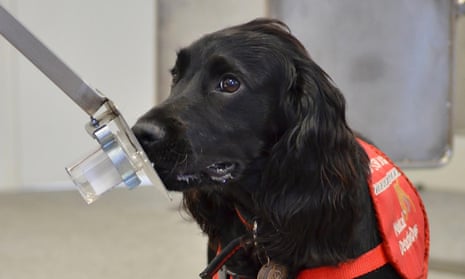Hopes that man’s best friend can help medics detect prostate cancer have been boosted by research suggesting that trained German shepherd dogs can sniff out the chemicals linked to the disease from urine samples with remarkable accuracy.
The reliability rate reported by an Italy-based team in the Journal of Urology comes from the latest of several studies stretching back decades and raises the prospect of canines’ sense of smell helping doctors identify a number of human cancers and infectious diseases.
The two female dogs sniffed urine samples from 900 men, 360 with prostate cancer and 540 without. Both animals were right in well over 90% of cases.
The paper’s authors, from the Humanitas Clinical and Research Centre in Milan and other institutes, admitted further work is needed to determine just how valuable the dogs’ skill might be in identifying, in daily practice, the signs of prostate cancer.
Cancer of the prostate is the most common type of the disease in British men, with 40,000 new cases reported every year.
Unanswered questions included what it was the dogs actually smelled and whether this was a single odour or those from a mixture of chemicals.
At present, prostate cancer is detected by a blood test known as the PSA test, by physical examination and by biopsy. The PSA test is not routinely offered because it is not considered reliable enough for screening.
The Italian results were welcomed by the Buckinghamshire-based charity Medical Detection Dogs, whose co-founder Claire Guest said its research indicated a 93% reliability rate for dogs. She said the results from the new study were “spectacular”.
She added: “They offer us further proof that dogs have the ability to detect human cancer. It is particularly exciting that we have such a high success rate in the detection of prostate cancer, for which the existing tests are woefully inadequate.
“Over the years, millions of pounds of NHS funding has been poured into the traditional test methods, and yet there has been little improvement in their reliability.”
This had caused “a huge waste of resources”, Guest said, not to mention distress to individuals.
“The detection dogs provide an alternative solution that yields consistently accurate results. If our detection dogs were a machine, there would be huge demand for them.”

Comments (…)
Sign in or create your Guardian account to join the discussion